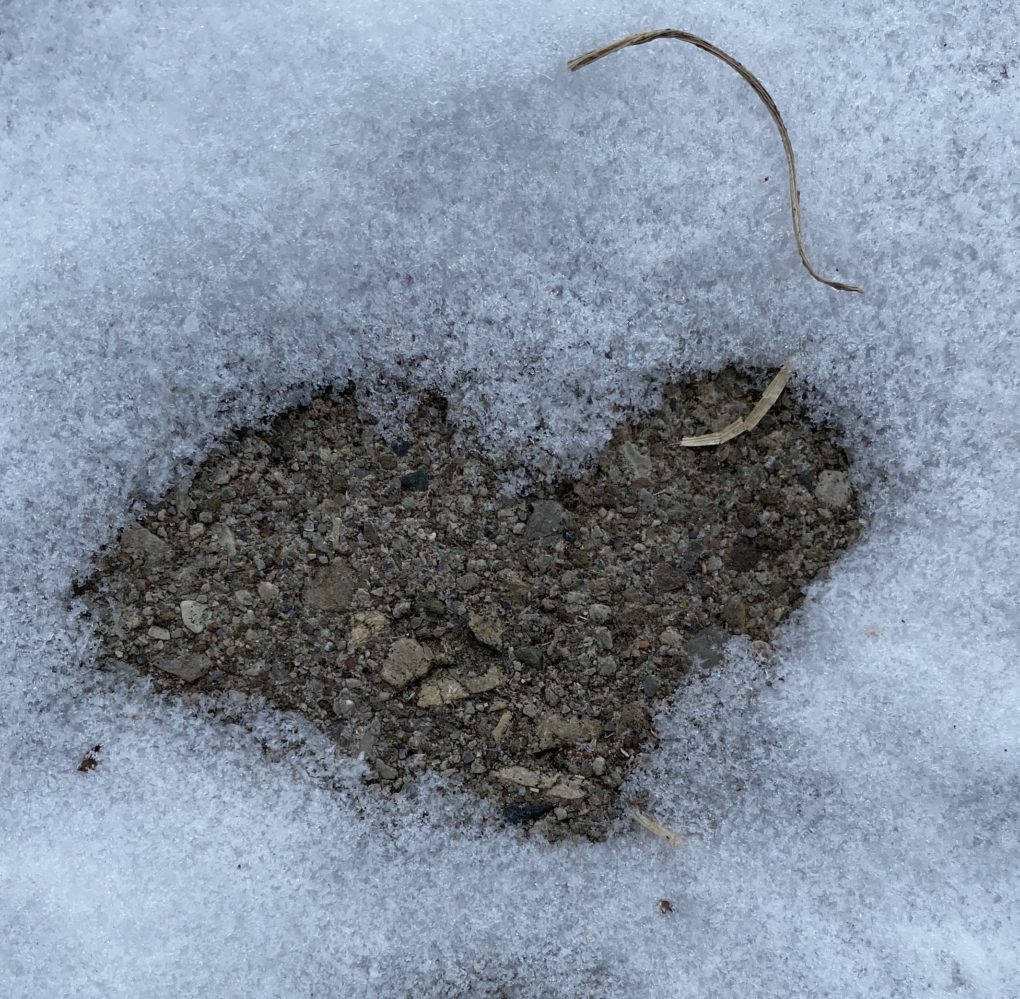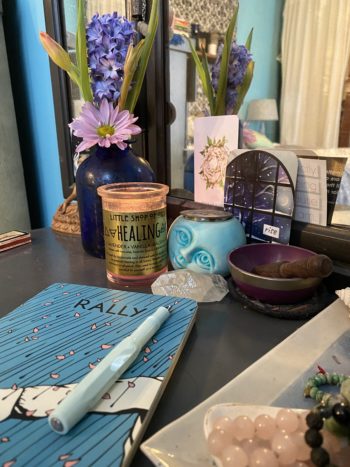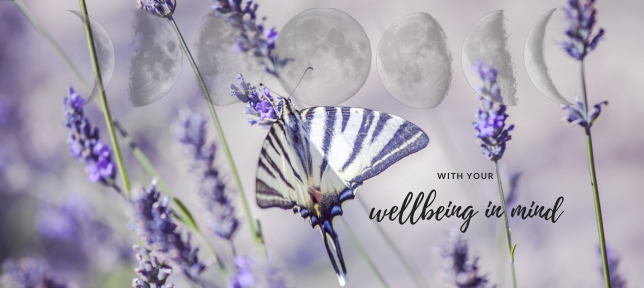This month, I have been diving into what ‘self-love’ means. Each year in February, i do a daily practice to honour what needs tending. It is a practice of self-love, and yet it remains a work in progress that is fluid and ever-changing.
This year, the pandemic has flipped the practice on its head. Not because it made it harder to do, as most of the exercises and rituals are things i do at home in private, but rather the need to do it was made even clearer.

This year has pushed so many of us to our edges. We are surviving a global pandemic, some are faring easier than others (privilege, geographic location and government decisions all play a role in this). We are also just getting by and now are finding that our survival and coping strategies are not enough for our bodies to sustain and thrive. There is a light at the end of the tunnel. And yet the cracks in our boats are starting to be felt.
I felt the initial shock of the pandemic very hard. I remember being in the fetal position, crying, and screaming more than i want to admit. I was one of the lucky ones – my job became an essential service as did my partner’s, and we could work at home. I found it hard as community is a big part of how i stay regulated in my body, and i was forced to shelter at home. Again, i am lucky to be home with family and yet i also need a break from them in order to get that balance. This is the epitome of mixed feelings that make us feel stuck in a hamster wheel of guilt and gratitude.
So, this past year, i have been noticing how practices of self-love can be that salve for our mind body and soul. I have been taking more time to myself, be it an early evening long bath, reading a lot, and intentionally reaching out to my community. It was with these commitments that i started to see how i practice self-love regularly, and have some principles that i adhere to.
Before i share them, i wanted to unpack the differences between all of these ‘self’ words – no wonder the ‘self-help’ industry is so abundant. It is also important to note that while work on our Self is a private and independent act, it thrives in community and co-regulation with others. The healing process of therapy is successful mainly because of the relationship; whereas self-help books done in isolation are not as productive. The concept of Self comes from various psychologists from yesteryear. Jung speaks of it and Schwartz (of Internal Family Systems) speaks of the Self and it’s 8 C’s – (check out this helpful PDF here.) I have adapted from these as well as my own work on my Self.
Self-Worth is seen as the way of holding yourself in high regard and worthy of respect and happiness, and Self-Esteem is how we see ourselves and relies on self-worth. Self-Love is the action that is behind the feeling and thought, and it requires some acceptance of our Self as we are. Each of these concepts do not exist in a bubble and are influenced by our community, culture, and connections to others. They are shaped by our early attachments and also can be healed when we are not shown love as children. This is why self-love work is so important for re-parenting that inner child who is wounded.
There is a shadow side to Self-Love, even more than the other selfs of worth and esteem, acceptance and compassion. We are taught to be modest, especially for those of us who identify as women. To have love or esteem for oneself is vain or immodest. This needs to change, and we need to reclaim that sense of holding our Self in high regard as not only sustainable but our birthright. Those of us in femme bodies especially struggle with this shadow side – White supremacy and patriarchy have benefited from capitalism’s profiting off the modernization of our way of living. Feminine Sensuality is very much a needed part of our herstory that needs tending to again. We must move away from a male-centred value system. But that is a topic for a later article…
As self-love gets a bad rap, i wanted to share quickly what it is NOT – being conceited and holding your needs as superior over others (we are all perfectly imperfect and valuable as is); giving yourself a free pass whenever things are hard or go wrong (love admits mistakes and working on them); remaining stuck and unchanging or being rigid in your routine and views (self-love is ever-changing, evolving, and learning), relying on other’s compliments to validate me (though i’m not entirely sure i need to love myself before others love me either); performative self-care acts or rules to follow just because (it is a felt-sense of something in the moment and looks differently as moments are fleeting).
Self-Love is sometimes connected to Maslow’s Hierarchy of Needs, as a process of getting there after tending to body needs, safety, connection via self-awareness and then self-acceptance. I wonder if it’s more complex and non-linear than that. It incorporates the various parts of self – physical, spiritual, social, emotional, and mental realms. To me, Self-Love is an Intentional Commitment (gotta do the work!) that helps me get a felt sense of inner glow, empowerment, sovereignty and affection for my Self.
Here are the 6 Ways i Practice Self-Love
Boundaries
While these are not in any order, I think it’s important to know the role of boundary setting in order to help us feel self-love. When we can say no to outside expectations, requests, demands, or assumptions, we are honouring our own needs. We deserve to honour our own time, body and decisions. We are putting our Self on our priority list. This is hard for many of us to do, and yet the reward is us tending to what is important – our safety, autonomy, time and voice. As social creatures, we thrive in community but sometimes that community is not safe or respectful of our boundaries. We need both time alone to rest and time in community to feel connected. We need breaks from devices and social media as well. As there are different types of boundaries, it helps to learn them – maybe you want to start with practicing saying No, or maybe a more energetic or emotional boundary that seems more attainable.
One Small Thing: Take stock of your friends and family and see who honour and respect your No
Self-Compassion
Self-love is the response to giving myself compassion and care, as i do for others. Self-Compassion and Self-care are the actions we take that help us embody the affection we have for our Self. So, it is the kind self-talk that intentionally works on forgiving myself for a mistake; it is the voice that quiets the judgement that sneaks in; it is the Permission Slips that remind me that i am perfectly imperfect like all humans. It is also the times i validate myself and take pride in what i do. This is how i hold space for myself and honour me, because if i don’t than this is what I’m modeling for others. This is where mindfulness of the here-in-now moment is sacred, slowing down and being present in my body is self-love.
One Small Thing: Write out some Permission Slips to have ahead of time – i.e. i give myself permission to make a mistake and then give myself a hug
Self-Trust
One of the benefits of learning more about self-care and self-compassion practices is the ability to learn how to trust our Self. When we listen to our needs, honour them, and are guided by our intuition and not our fear, we can then make confident decisions. Sometimes, that means also needing to learn how to NOT believe all i think as well. That may be a part of us showing up that is wounded, or the Inner Critic who is worried about making a mistake. When i start to listen more to my Self, i know where the worry is coming from: That is trust. Another important aspect of self-love is being able to work on our goals, dreams and plans – when we trust our Self, we see how the cycle of our life can impact our plan, instead of feeling hopeless or pessimistic. Knowing that i am working on my goals in general, and that my mood impacts my optimism is a big step to keeping on task with my dreams.
One Small Thing: Do a Needs Assessment for a day and honour some, be it a glass of water or changing stop scrolling through social media when it starts to hurt
Pleasure
We can’t have love without pleasure and playfulness. As Deb Dana talks about “glimmers and glow moments’ we need to have these examples to remind ourselves that we can be happy, present, and capable of pleasure. Self-love does mean giving ourselves a Gift sometimes, and taking stock of achievements. As the old commercial reminds us, we are worth it. This is where the ritual of gratitude is meaningful. When we see our achievements and our proud of ourselves, we feel empowered. When we find ways to play and be present, we are attuning to our heart’s desire. Is there a pet project you love to focus on for instance? To take it a step further, our Home life is also a reflection of this. Is there a space in your home that helps hold your pleasure practice? What rituals do you have honour that captures it.
One Small Thing: Create a Pleasure Corner with some cozy items in your home (think of a comfy chair, candles, a book and blanket to have on hand)
Know thy Self
After this past year, many of us have learned what our limits and needs are. We have been stretched to the max, exhausted, overwhelmed and afraid. When we learn more about our own nervous system and its capacity (also known as Window of Tolerance), then we can tend to our wants, likes and needs. It is so helpful to know when we are reacting in Fight Flight Freeze Fawn, and when we practice self-love, our needs are being respected. When we know if we are regulated or getting dysregulated, we can pull out the best resource from our ‘toy box’ of tools to tend to our Self. This is a sort of Love Map of my Self. Anyone who has endured trauma benefits greatly from this inner work, to heal and integrate the trauma and Shadow side (also called Fragmented Parts). Another important part of knowing our Self is to learn what our Attachment Styles and ancestral stories are, so that we can listen to the inner dialogue of our Parts that are trying to take up airspace, in order to help us be safe in the world, as well as what shaped us to become who we are and how we think about our selves and worth.
One Small Thing: Learn more about what you need to stay emotionally regulated and create a cheat sheet for when you need it
Body Attunement
Another part of self-love work that can be tricky is our relationship to our body. A lot of us were taught to be modest – to take compliments with grace, to not be vain, to not hold our appearance to the highest regard. This has lead to a disconnect between our Mind and Intellect to our Body and its appearance. Further, it has made our thinking brain the powerhouse to admire and be proud of, and puts our body in the shadows, especially when it comes to pleasure, ability and size. So, self-love rituals most include ways to move the body, listen to it, and do healing work (whether it is talk therapy, walks, yoga, massage, what you eat, etc). Move your body and then rest it, eat nourishing food, take breaks, have that bubble bath. When we reclaim Embodiment and Bodyfulness, we are more attuned to what our body is telling us – and it never lies: Listen to it.
One Small Thing: Put on some of your favourite music and see what your body does in response; try a 3 song minimum

Still unsure how self-love works? I had been finding the ritual of journaling to be so helpful – taking time to reflect, give myself a new perspective, as well as slow down and stay with my feelings is a powerful way to practice self-love. It is a way of holding space for myself.
So, if you are stuck on this concept, how about taking some time to reflect on some of these journal prompts:
*When did i show myself love this week?
*What is my favourite time of day and how to i linger in it?
*When do i feel happy? When have i felt happy – reflect on a time in your past.
*How do i feel connected to my needs?
*Write a love letter to myself from my Wise Self, or to my Inner Child Part
*What are 5 positive things to tell myself that i am proud of doing this past week?
Remember, self-love is a powerful way of reclaiming sovereignty over yourself – itself a radical act of self-care so be gentle with your Self: we are all a work in progress. It is your birth rite after all.

